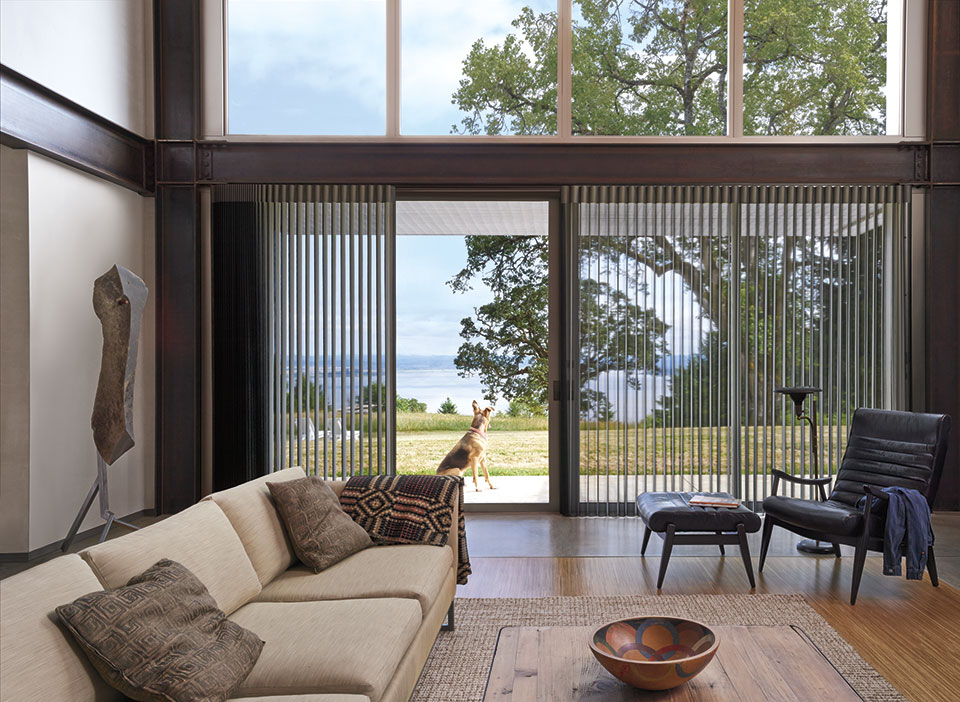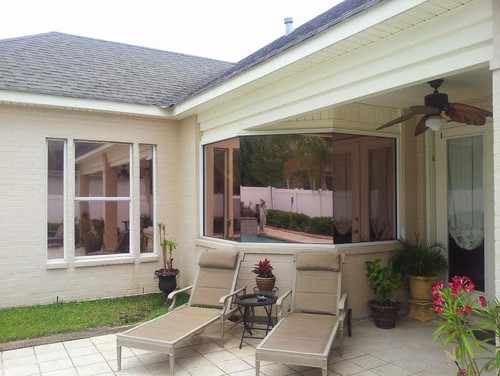Solar Shades Versus Window Tinting: Pros and Cons
We’re all aware of the dangers of UV rays. We need sunscreen for our skin and sunglasses for our eyes, but what about our homes? Yes, we all want to enjoy the benefits of natural sunlight, but it’s also important to keep our home well-insulated and protect our furniture and floors. There are two main ways to do this – via window tinting and solar shades. Both have their pros and cons. And, although we might be a bit biased – we sell solar shades, not window tinting – we have good reasons to support our recommendation. Read on:
What is Window Tinting?
Window tinting is the process of bonding film — usually composed of a transparent layer of polyester film with a thin layer of a tinting agent, such as dyes or carbon—to a window pane. Adhesive is used to bond the tint to the windows. Window tints can be specialized to fit certain customer needs including: privacy, heat control, and security against shattering.
Pros of Window Tinting:
- Lowers Energy Costs: Window tinting prevents heat from penetrating your home and also retains heat during the winter months, reducing heat loss. This dual effect lowers electricity and fuel costs.
- Preserves Skin and Eye Health: Window tinting shades UV rays and excessive light from entering your home which protects your skin from sun damage. It also lowers the glare factor which can hurt your eyes.
- Furniture and Floor Protection: Window tinting is proven to prevent premature fading in your furniture and hardwood floors.
- House Plant Protection: Excess sunlight and glare can have adverse effects on your houseplants as well. Window tinting reduces glare and protects plants from light overdose (although it’s a fine line between too much light and not enough light).
- Shatter Safety: Tinted windows are more resilient than non-tinted windows. But if a window breaks, window tinting will prevent glass from splattering, which lowers the risk of personal injury.
- Window tinting has come a long way since it was first introduced to the residential market.
Cons of Window Tinting:
- Limited Use: Certain types of windows, such as double pane, low e windows, should not be tinted. A window tint may compromise the quality of the window and could cause permanent damage.
- Window Warranty Jeopardy: Homeowners applying window tint should also be advised that this treatment can often void the window’s warranty. Some tinting companies may offer to cover the warranty if the manufacturer voids it, but the resale value of the house could be negatively affected.
- Temperature Issues: Window tints can often insulate too much heat, causing rooms to be warmer than intended and creating a risk that the glass will expand and crack.
- Installment Difficulties: If installed incorrectly, the tinting can bubble or even peel. It’s important to hire well-trained professionals so your beautiful windows aren’t ruined.
What Are Solar Shades?
Solar shades, on the other hand, are screens typically woven from polyester that block excessive light from entering your home. They have a similar aesthetic to regular window treatments with the added benefit of filtering out UV lights. Solar shades can be coated with PVC for added durability and can be ordered with a custom openness factor, meaning clients can control how much light they want to filter through the shades.

Pros of Solar Shades:
- Lowers Energy Cost: Solar shades prevent heat in the summertime and retain heat in the wintertime. These factors help to lower your energy costs. But solar shades are even more effective than window tinting at preventing heat because they keep the window glass cool in the summertime.
- Promotes Skin Health: Solar shading is more effective than window tinting at preventing UV rays and excessive sunlight from damaging your skin.
- Versatility: Unlike window tinting, solar shades can be used on virtually any type of window.
- Stylistic Variety: Solar shades are available in a wide variety of designs, which gives you the freedom to choose a style that fits your home.
- Glare Reduction: They reduce the glare in interior spaces, making it easier to view electronic screens. This reduction protects your vision from being harmed.
- Intact Warranty: Unlike window tints, solar shades do not jeopardize your window’s manufacturer’s warranty.
- Flexibility: While window tints are permanent, solar shades can be rolled up at any time during the day, or seasonally, throughout the year, providing a flexibility window tints cannot. So if you want to have a day with a clear view of your backyard, you can simply roll up the shades. The shades can even be motorized and controlled with a wall switch or a remote control.
- Installation Convenience: They are fast and easy to install and do not negatively affect the resale value of your home.
Cons of Solar Shades:
- Aesthetic Issues: Although solar shades don’t affect your view from the interior, from the exterior looking in, certain types can make the house look dark, almost as if it’s wearing sunglasses. This style isn’t for every homeowner.
- Too Much Darkness: Solar shades can be too effective, meaning that you end up spending more money on interior lighting. For some people, this negative could also be a positive.
- Vulnerability: Solar shades are subject to damage in stormy weather conditions, and may require repair from time to time.
- Air Flow Inhibition: Some types of solar shades can be so thick they reduce air flow, which can be a problem for some homeowners who value windows as ventilators.
To learn more about window tinting versus solar shades, schedule a free consultation with one of our window coverings experts. We’ll take a look at your windows (and which direction they face), giving you our honest opinion as to which option might work best in your home.



